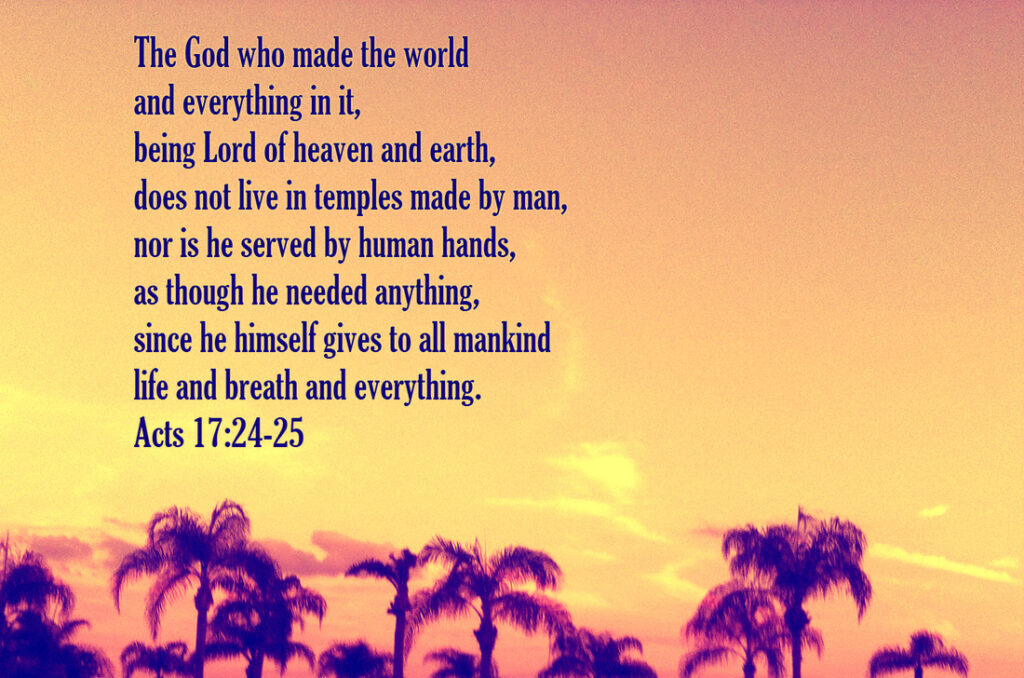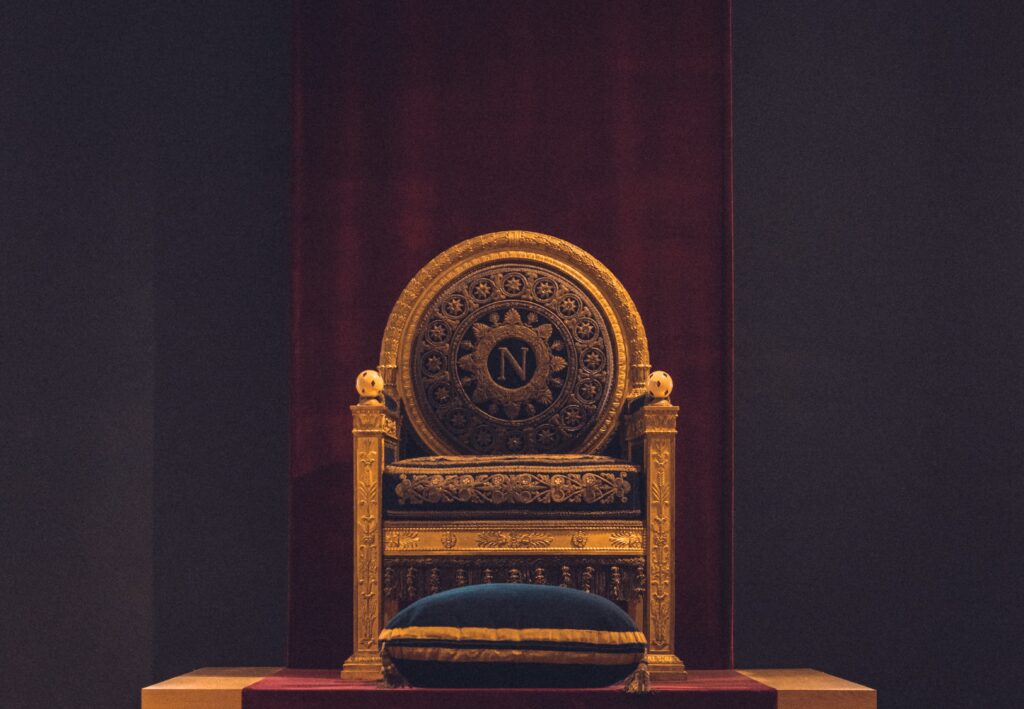God Doesn’t Exist To Take Care Of Us
Over the years, I have noticed a tendency to reduce the very existence and essence of God to his role as the one who provides for the needs of his creatures. In this reductionistic mentality, God is Santa Claus, the man up there in the sky whose whole purpose is to cater for us. God is just there to sort us out and we try to give him some offerings once in a while to encourage him to do his job.
The picture of God that the Bible portrays for us is so different from this reductionistic version. God is transcendent. God is holy. God does not need us. God does everything for his glory. God makes demands on people. God judges people. And God saves people. To reduce him to our Santa Claus is gross idolatry.
God does take care of his creatures
Of course, this is not to deny that God does take care of his creatures. In Psalms 104, we learn that all creatures look to God for their food and in response, he satisfies them all with good things (verse 27, 28). When God opens his hands, he satisfies the desires of every living thing (Psalms 145:16).
God shows kindness to humanity, the climax of and king over his creation, by sending us rain, giving us crops, providing us with food, and filling our hearts with joy (Acts 14:15-18). In fact, every good and perfect gift comes from him (James 1:17) and there is nothing we have that we did not receive from him (1 Corinthians 4:7).
In addition to his care over creation and humanity in general, God cares especially for his chosen people, the church. He supplies our needs according to his riches in glory (Philippians 4:19), blesses us abundantly with all we need so we can abound in every good work (2 Corinthians 9:8), and he gives us all we need for life and godliness (2 Peter 1:3).
But God does not exist because of us
God existed in the fullness of his essence before he created anything; therefore, no created thing is essential to God’s existence. Theologians call this the aseity of God. God did not create out of need since God has no need. He had no potential that he wanted to realise by creating man; God is pure act. Human beings, or any other created thing, don’t contribute anything to God’s essence. Said simply, he doesn’t need us.
As Paul said, God “is not served by human hands, as if he needed anything” (Acts 17:24). He doesn’t need anything (Psalms 50:8-12); instead, he gives life and breath and everything else to everything else (verse 25). No one has given him any gift that he needs to repay; God owes no man anything (Romans 11:35, Job 41:11).
Therefore, our existence is not necessary for God to be who he is in his essence. To reduce him to the man above the skies that just exists to give us anything we want is to think that God’s existence and essence are dependent on us or that he would be nothing if we didn’t exist.

Instead, everything exists for his glory
The actual fact is otherwise: we exist for God. God does not exist to meet our needs or to glorify us; rather, we, and all created things, exist for the glory of the triune God.
We exist by his will (Revelation 4:11) and for his glory (Isaiah 43:7,21). All things exist from him, through him, but also for him (Romans 11:36). We would not have existed apart from him and our existence has no meaning apart from him. So, when we eat, drink, and do anything else, it must be for his glory (1 Corinthians 10:31).
In fact, God does everything for his own glory. The salvation of man is for God’s glory (Ephesians 1:6). When God defers his anger and tries his people in the furnace of affliction, it’s for his glory (Isaiah 48:9-11). When he does miracles, it is for his glory (Psalms 106:7-8).
In essence, everything exists for God’s glory and God does everything for his glory. God does not provide for the needs of his creatures because he exists for them; he does it to display his glory and to cause those who behold it to glorify him.
Compared to his transcendence and sovereignty, “all the peoples of the earth are regarded as nothing” (Daniel 4:35). “Surely the nations are like a drop in a bucket; they are regarded as dust on the scales; he weighs the islands as though they were fine dust … Before him, all the nations are as nothing; they are regarded by him as worthless and less than nothing” (Isaiah 40:15). How can we add to God when we are like a drop in a bucket? How can God exist for us when we are even less than nothing compared to his glory?

God is transcendent and holy
Though God condescends to relate to his creatures we must never forget that he is above and beyond his creatures. God is not the most powerful human being that rules over other human beings, he is a whole different being. He transcends us.
He is the high and exalted One who lives in a high and holy place (Isaiah 57:15). Actually, heaven and earth cannot contain him (2 Chronicles 2:6). And there is no one holy like him, no one besides him, and no Rock like him (1 Samuel 2:2). Moses described him as “majestic in holiness” and “awesome in glory” (Exodus 15:11).
His thoughts are not ours nor are his ways (Isaiah 55:8).
God is not one of us; he is the holy other. This is why no man in this fallen state can see his face (which itself is an anthropomorphic language since God is a spirit) and live (Exodus 33:20).
God is sovereign
Since every created thing exists for his glory, God is sovereign over them all. He “works out everything in conformity to the purpose of his will” (Ephesians 1:11). When he acts, no one can reverse it (Isaiah 43:13). And when he purposes anything, no one can thwart it (Job 42:2). As Nebuchadnezzar discovered, “the Most High is sovereign over all kingdoms on earth” (Daniel 4:32), “he does as he pleases with the powers of heaven and the peoples of the earth. No one can hold back his hand or say to him: “What have you done?” (verse 35). His purpose will stand and he will do all that he pleases (Isaiah 46:10).

Implications
The above facts — we exist for God’s glory, God is transcendent, holy, and sovereign — have implications for our relationship to God.
God demands our worship
God does not just display his glory by supplying the needs of his people, he calls on all humanity to glorify him through worship.
He is our God and we must bow down in worship before him, kneeling before the LORD our maker (Psalms 95:6-7). The kingdoms of the earth (not just his chosen people) must sing praise to him (Psalms 68:32).
God has displayed his existence, eternal power, and divine nature to everyone through the things he created, requiring us to glorify him and give him thanks (Romans 1:18-20).

God demands our obedience
One of the ways God displays his glory is through the obedience of his creatures. As those who exist for his glory, we are duty-bound to obey him and do everything in accordance with his will.
His natural law is written on the hearts of everyone — unbelievers and believers alike (Romans 2:15, 1:20) — and from that law we know the obedience we owe to him. We know the things that are contrary to the natural law he has placed in us (Romans 1:26-28) and the things that are in line with it (Romans 1:21). And in the moral laws of Scriptures, he has reiterated those demands and made them clearer to us.
To live for God’s glory is to seek to obey him and do everything in conformity to his will and good pleasure. As Qoheleth said, “Now all has been heard; here is the conclusion of the matter: Fear God and keep his commandments, for this is the duty of all mankind.” Every human owes God the duty of obedience as the one who created us for his glory and sustains us in his providence.
God demands that we seek him
Paul summarised this duty in his speech to the Athenians, “From one man he made all the nations, that they should inhabit the whole earth; and he marked out their appointed times in history and the boundaries of their lands. God did this so that they would seek him and perhaps reach out for him and find him, though he is not far from any one of us.”
We have fallen short of God’s glory
However, instead of worshipping God, we worship created things (including ourselves). And instead of obeying God’s law, we pervert nature, disobey God, and produce all sorts of wickedness and unrighteousness (Romans 1:18-32).
When Adam and Eve sinned, they were separated from God — a great gulf was fixed (Genesis 3:24). And every human is now in a state of alienation from God (Isaiah 59:2) — an alienation that Paul describes as “fallen short of God’s glory” (Romans 3:23).
Instead of seeking him, we seek to run away from him to created things. “There is no one who seeks God. All have turned away, they have together become worthless; there is no one who does good, not even one” (Romans 3:11-12).
God is our judge
Since God is holy, he won’t overlook our idolatry, disobedience, and rejection of him. The Father has appointed the Son as the judge of the quick and the dead (Acts 17:31, 2 Timothy 4:1, Acts 10:42). Every man will appear before this judgment throne (Romans 14:12) to give an account of themselves.
But if all men are alienated from God in their sinful state, we already know the result of the coming judgment. Since God is perfect and demands nothing less than perfection, all humans are heading to their doom, awaiting the wrath of God, which is already present (Romans 1:18, Ephesians 2:3, 5:6).
So, God is not just the one who provides for the needs of all humans, he is also the holy and righteous God who will pour out his holy justice on all those who have refused to worship, obey, and seek him.

God is our saviour
But this is not the end of the story. The Son who is the judge of the quick and the dead is also the saviour of the world. “For God so loved the world that he gave his one and only Son, that whoever believes in him shall not perish but have eternal life” (John 3:16).
God the Son has taken our nature upon himself in the incarnation so that he can atone for our sins (Hebrews 2:17). The Father had made him who knew no sin to be sin for us so that in him we might become the righteousness of God (2 Corinthians 5:20).
Christ has offered the perfection that God requires. He has taken upon himself the punishment for our sins and offered us his own perfect righteousness. By doing this, he has provided a way for us to be reconciled to God so that instead of wrath, we will live with the triune God in eternal bliss (Revelation 21:1-5).
But the God who provides for all our needs also calls on us to repent and believe in Jesus Christ as the only path to salvation. We must repent and be baptised (Acts 2:38), declare with our mouths that ‘Jesus is Lord,’ and believe in our hearts that God raised him from the dead (Romans 10:10-13).
To reject Christ is to embrace wrath (John 3:36) but to receive him is to possess life everlasting.
When we receive Christ, he saves us from sins — cleanses us from the guilt of sin, and delivers us from our enslavement to sin. This deliverance from enslavement now frees us to fulfil the purpose for which God created us — glorify him.
Now, we can worship him in spirit and truth (John 4:24), obey him from a forgiven and cleansed heart (Hebrews 10:19-25), and seek him as the bishop of our hearts (1 Peter 2:25), not as slaves seeking acceptance but justified saints.

Conclusion
God is the provider of our needs but he is more than that. He exists apart from us and his essence does not depend on our existence or his condescension to relate to us. God is holy, transcendent, sovereign, and everything exists for his glory. Because of this, our relationship to him includes his demand for our worship, obedience, and pursuit of him. We have fallen short of his glory, worshipped creatures, disobeyed him, and are now alienated from him. Consequently, we are all under his wrath, destined for eternal condemnation.
But in Christ, he has offered pardon for our sins and provided us with his righteousness. If we repent from falling short of his glory and believe in Christ, we will exchange eternal wrath for eternal bliss and condemnation for justification. And we will be freed from our enslavement to sin to worship, obey, and seek God eternally.



